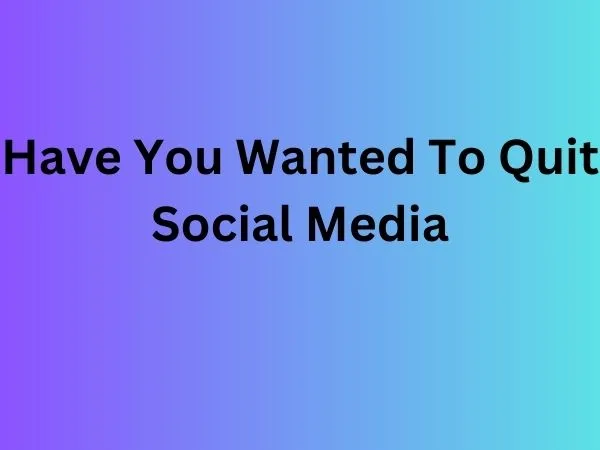
Introduction
At this point, I’m addicted to social media. I’m always on it 24/7. When I’m running or doing chores I check my Instagram and TikTok every 20 minutes and it isn’t very pleasant. Every im out I always have to post something and check every 30 minutes who saw my post. I hate it. I just want to live a private life and stay off social media at least four times a week. So I can focus on myself and my goals.
Just delete them? Another way if you have problems is to go to your close friends or parents and have them delete them for you. They’ll understand because these networks were made to be addictive.
“If you want to stay on social media but not let it completely overwhelm and consume you then try to limit your time on them. For example, set an appointment for yourself three times a day … Give yourself 10 minutes of social media time.
Download your data from whichever platform you use … After time has passed and you’ve established alternative means of contacting everyone you want to keep in touch with, delete your accounts.”
“If you feel that social networks are a waste of time for you, by all means, go ahead. Other people must browse social networks to bring peace and combat their hectic days.
Social media in my opinion isn’t necessarily a bad thing. Technology has gone far and SM is a great way to stay connected, especially among the younger generation.
About Instagram, I think it’s a horrible “app”. With Instagram, you are subconsciously comparing yourself to other people. When you see a post, you might reflect on your life and compare it to the poster.
Everything revolves around:
How often do you post
The content you post, do you post photos of food? Of you partying? Sexualising content? Holiday photos? Family photos? Beauty products or hair products?
How many followers do you have?
People will follow you depending on what you post and how it relates to them. It forces you to evaluate your self-worth and popularity with numbers: How many posts you have, how many followers you have, how many people like your content, etc.
Rather than knowing you for who you are and how you speak, people know you for what you post. It’s an unhealthy app. Now I can’t speak because I don’t use it, I have an account but I don’t touch it. I stick with Facebook because it’s all I need.
If you need Instagram to feel connected then by all means stick with it. However, if you feel like it’s taking up your life and you think you have an obsession with it. Then you need to limit yourself and not let it overcome your life.
There are other things to do than to look at what other people are doing with their lives.
Is It Good to Quit Social Media
Some studies have shown when adults quit or limit social media, loneliness, and depression scores improve — and rapidly. Other data is less clear: While social media use is often associated with poor mental health, it can be hard to say which comes first.
Social media provides us with endless streams of reasons to feel inadequate about ourselves and our lives, but quitting may help relieve the need to constantly compare against others; it’s difficult to be envious of someone’s new sports car when you don’t know they got one.
The benefits of quitting social media can vary depending on the individual and the type of relationship they have with social media.
Mental health: Taking a break from social media can improve mental health and well-being, and reduce feelings of depression and loneliness
Focus: Quitting social media can help you feel more focused and calm
Sleep: Quitting social media can improve your sleep.
Real connections: Quitting social media can help you make real connections
Confidence: Quitting social media can boost your confidence.
However, there are also some potential drawbacks to quitting social media, including:
Missed information: You might miss out on important information.
Reduced social connection: You might feel a sense of reduced social connection.
Professional impact: Quitting social media might impact your professional life
Research on the benefits of quitting social media is mixed, with some studies showing positive results and others showing less clear effects.